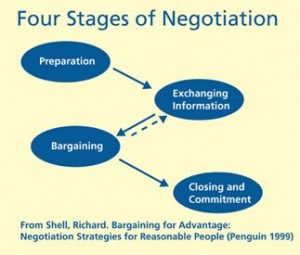This negotiating advice was given to me many moons ago (too many to count …)
The first, and still to this day best, sales advice I ever heard was:
“There are only 2 good answers in sales: ‘yes’ or ‘no’. ‘Maybe’ is a waste of your time.”
If you’ve never heard this expression before, you may be experiencing the reaction I first had when I heard it: “What are you talking about? Maybe isn’t a no … so that’s good right?”
Wrong.
After working my tail off for the past three years starting MKG Media Group, I’ve learned how to break down the three answers you may receive:
- Yes is pretty self-explanatory; as in “yes, I’d like to give you a pile of money or valuables to perform XYZ…”
- No is a little bit more nuanced. No can be “no, not right now”, “not ever”, “not until you prove that you are better than your competitor at doing xyz” …. You get the picture. The list goes on. No is really just a great time for you to say “Thank you for your time, what was it that threw you off if it’s not too much to ask?”
Maybe is a whole other beast; one that I have gotten to know (too) well over the past three years. If I were to sum up my top two ‘maybe’ experiences they would probably go something like:
- “Maybe if you reworked the numbers and then re-presented to my entire team a few more times” is the same as “we sort of like your ideas and are going to actively rip your creative thinking and execute this ourselves or literally hand it off to our existing supplier/vendor/partner/what-have-you”
- “Maybe you should talk to our colleagues in the other department” is the same as “we’re going to try and get them to buy this with their budget but we will totally use the product/service when they do”
Why is maybe a huge problem?
Because ‘maybe’ doesn’t get you close to a yes or a no; that is, a definitive answer.
‘Maybe’ results in you doing a bunch of extra work to try and get to a no or a yes.
‘Maybe’ often means you didn’t do a thorough enough job during the preparation (stage 1) and exchanging of information (stage 2) stages of the sales process (see chart below)
Last but not least, maybe is often used as a negotiation tactic: “Maybe we can move forward, pending you reducing price by x% …” or “…delivering the service faster” or (my favorite) “billing us on accrual for services rendered on a net 60 payment cycle” (in English: you have to do all the work and then wait 60 days to actually receive a dime).
How do you get past ‘maybe’?
By no means should you follow these ideas to a T — I’m just a normal guy like yourself and no rainmaker like Rick Robarge (or insert other stud sales guy/gal’s name here), but here are a few tricks that I’ve picked up over the years.
- Contract term length
- Payment schedule
- Deadlines & Ultimatums
Contract Length
I’ve experienced prospective clients asking our company to do more work for proposed costs/less money quite a few times.
Oftentimes, these are clients who say things like “I’d love you to prove yourselves; if you can bring me $XYZ amount of revenue we’ll increase your budget no problem.” (side note: uhhh duhhhhh)
In this scenario, I usually ask them to guarantee a certain length of the contract. I’ll use a line such as:
We are happy to consider your request, but in return would you consider guaranteeing us 180 working days to hit our agreed-to success metrics?
Notice how I didn’t agree to anything; it’s important in conversations or written communications never to agree to anything (I call this the Japanese ‘yes’, which I’ll write about in a different post).
I’m simply asking that in return for considering this request, I’d like something in return.
Payment Schedule
Particularly for brand new clients, I’ll ask them to pay the first month of the contracted amount (or a larger portion, depending on the circumstances) entirely, 100% up front.
What does this tell me?
It shows our team that they are ready to invest in the proposed services and, quite frankly, gives me confidence that they are serious about their needs.
Deadlines & Ultimatums
Deadlines and ultimatums are helpful for a few different reasons:
- Deadlines inherently imply urgency; they force the hand of your negotiating partners timeline so that they get serious about making a decision *this lifetime*
- Ultimatums are great when price is a real sticking point; an ultimatum such as “what is the number you are willing to spend?” cuts through the clutter and tells you what they are willing to spend on a given product, service, etc. Once you have “their number” you can align the exchange accordingly on your side of the table.
Those are just a few of my favorite tactics: What tips have you found helpful in the past to get from ‘maybe’ to ‘yes’ or ‘no’ during a negotiation?




